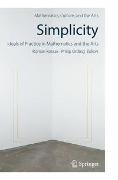Read more
To find "criteria of simplicity" was the goal of David Hilbert's recently discovered twenty-fourth problem on his renowned list of open problems given at the 1900 International Congress of Mathematicians in Paris. At the same time, simplicity and economy of means are powerful impulses in the creation of artworks. This was an inspiration for a conference, titled the same as this volume, that took place at the Graduate Center of the City University of New York in April of 2013. This volume includes selected lectures presented at the conference, and additional contributions offering diverse perspectives from art and architecture, the philosophy and history of mathematics, and current mathematical practice.
List of contents
Inner Simplicity vs. Outer Simplicity (E. Ghys).- The Complexity of Simplicity: The Inner Structure of the Artistic Image (J. Pallasmaa).- Thinking in Four Dimensions (D. McDuff).- Kant, Co-Production, Actuality, and Pedestrian Space: Remarks on the Philosophical Writings of Fred Sandback (J. Kennedy).- What Simplicity Is Not (M. Malliaris).- Constructing the Simples (C. Franks).- The Simplicity Postulate (M. Senechal).- The Experience of Meaning (J. Zwicky).- Math Currents in the Brain (M. Gromov).- bc, becuz, because ASCII (K. Shepherd).- "Abstract, Directly Experienced, Highly Simplified, and Self-Contained": Discourses of Simplification, Disorientation, and Process in the Arts (R. Stewen).- Remarks on Simple Proofs (R. Iemhoff).- The Fluidity of Simplicity (J. Floyd).- "Mathematical Typography" (After Donald Knuth, 1978) (D. Sinister).- Simplicity Via Complexity (A. Villaveces).- On the Alleged Simplicity of Impure Proof(A. Arana).- Minimalism and Foundations (S. Gerhardt).- Economy of Thought: A Neglected Principle of Mathematics Education (A. Borovik).- Simplicity is the Point (D. Sullivan).- Appendix A: Simplicity, in Mathematics and in Art (A. Jackson).- Appendix B: Conference Program.- Index.
About the author
Roman Kossak's research is in model theory of nonstandard models of formal arithmetic. For over 30 years he has worked at the City University of New York, where he teaches developmental courses at Bronx Community College and mathematical logic and model theory at the Graduate Center. His other interests include phenomenology and interactions between mathematics and the arts.
Philip Ording is a member of the mathematics faculty at Sarah Lawrence College in Bronxville, New York. He received a PhD in Mathematics from Columbia University in 2006. While a graduate student of topology and geometry he began working as a mathematics consultant in art and architecture studios in New York. Since then he has published essays, curated exhibitions, and lectured on the intersection of mathematics and the arts.
Report
"I have been struck by certain rhetorical habits that are characteristic of writing, by mathematicians or artists or philosophers, about the arts or mathematics or philosophy. These habits-which are as remarkable ... are on display in the Book ... ." (Michel Harris,The Mathematical Intelligencer, Vol. 41, June, 2019)

